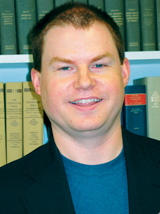This piece is part of an on-going blog series called Plurality 2.0 (watch video here). Full schedule of guest authors throughout April and May is available here.
John R. Franke is the Lester and Kay Clemens Professor of Missional Theology at Biblical Seminary in Hatfield, PA. He holds the DPhil degree from the University of Oxford and is particularly interested in engaging postmodern thought and culture from the perspective of missional Christian faith in order to explore the opportunities and challenges presented for the witness and ministry of the gospel in the contemporary setting. He is the coauthor of Beyond Foundationalism: Shaping Theology in a Postmodern Context (Westminster John Knox Press), the author of The Character of Theology (Baker Academic) and Barth for Armchair Theologians (Westminster John Knox). His most recent book, Manifold Witness: The Plurality of Truth, is forthcoming from Abingdon Press.
 I believe one of the most significant challenges facing the church is the sheer, existential reality of Christian plurality. While we often speak glibly of the Christian tradition, even a cursory glance at the history of the church should make us aware that at the end of the day we can speak only of the multiplicity of Christian traditions that make up what we refer to as the Christian tradition. The fact is that Christians disagree with each other on a host of significant theological questions that are accompanied by a dizzying array of answers.
I believe one of the most significant challenges facing the church is the sheer, existential reality of Christian plurality. While we often speak glibly of the Christian tradition, even a cursory glance at the history of the church should make us aware that at the end of the day we can speak only of the multiplicity of Christian traditions that make up what we refer to as the Christian tradition. The fact is that Christians disagree with each other on a host of significant theological questions that are accompanied by a dizzying array of answers.
What are we to make of this plurality in light of the witness of scripture to the one faith that was delivered once for all to the saints? How do we account for it theologically? What do we think of other Christian communities that live and practice the faith in ways different from ours? How do we relate the concern for the unity of the church with the concern for truth? Must we really choose between a pragmatic unity that seems to give up on truth and an approach to truth that appears to mandate a divisive and sectarian understanding of the church?
Several possible answers are readily available to account for Christian plurality. Perhaps the Bible is simply a collection of documents that contains mutually exclusive perspectives that render the biblical canon insufficient for the purpose of guiding and equipping the Christian community for common witness in the world. Perhaps God is not as generous in dispensing wisdom as is suggested in scripture or maybe the promise that the Spirit would guide the church into truth is idealistic and wishful thinking.
However, I believe that none of these answers is sufficient. I believe that scripture is inspired and given to the church as a means of grace in guiding belief and practice. I believe that God does not skimp on the promise to provide wisdom and that the Holy Spirit is in fact guiding the whole church, in all of its diverse manifestations, into the fullness of truth that is the living God revealed in Jesus Christ. In other words, in seeking to account for the diversity of the church, I want to do so with an outlook that presumes these core convictions to be true rather than jettison a confidence in scripture, the generosity of God in the provision of wisdom, or the promised guidance of the Spirit.
In order to do this, I suggest a simple thesis: the expression of biblical and orthodox Christian faith is inherently and irreducibly pluralist. The diversity of the Christian faith is not, as some approaches to church and theology might seem to suggest, a problem that needs to be overcome. Instead, this diversity is part of the divine design and intention for the church as the image of God and the body of Christ in the world. Christian plurality is a good thing, not something that needs to be struggled against and overturned.
In my book Manifold Witness: The Plurality of Truth, scheduled for publication with Abingdon Press this October in the Emergent Village sponsored theology series, I suggest that the diversity of the Christian community is a faithful witness to God’s intentions for the church. This plurality gives expression to the polyphonic character of truth as part of the manifold witness of the global and historical church to the God revealed in Jesus Christ. In keeping with this conclusion I believe that the church, as the image of God and the body of Christ in the world, is called to bear a unique witness to Jesus and that, by the will and intention of God, this witness is inherently and irreducibly plural. We cannot bear this witness alone: no one of us; no one of our churches; no one of our cultures or traditions. We need each other. I believe that this is the truth.